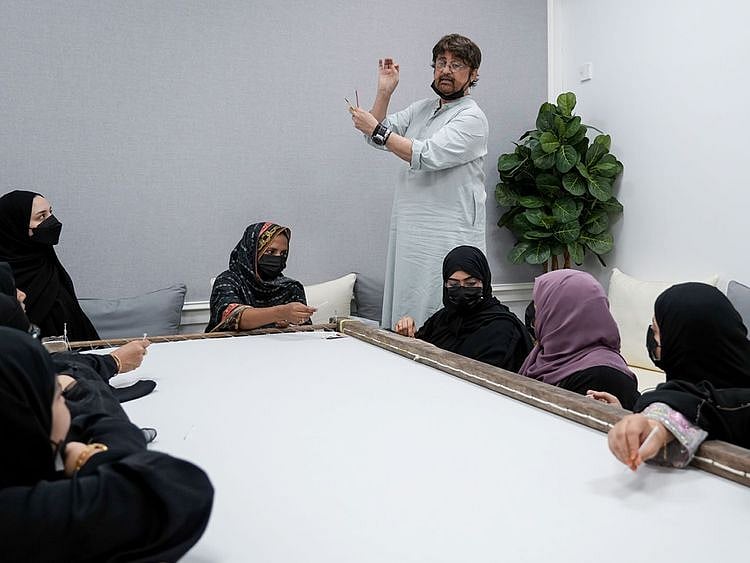UAE: Emirati, Pakistani craftswomen learn each other’s embroidery techniques
Irhti council leads 11-week artisan cultural exchange programme at Bidwa in Kalba city

Sharjah: Irthi Contemporary Crafts Council, an affiliate of NAMA Women Advancement, is enriching the artisanal heritage of Sharjah and the UAE and strengthening efforts to re-contextualise and reimagine Emirati handcrafting traditions with a skills and cultural exchange programme that aims to nurture the skills of Emirati craftswomen in the unique embroidery techniques of Pakistan.
Rizwan Beyg, Pakistan’s award-winning fashion designer, is enriching the skillsets of 20 women artisans at Irthi Skills Development Center in Kalba by guiding them in the intricate and richly evocative Ari and Needle embroidery traditions.
Building on the capacity of craft in transcending cultural and linguistic barriers and recognising its pivotal role in bridging gaps between cultures, Irthi’s new upskilling programme aims to elevate and sustain indigenous craft heritage. The cross-cultural endeavour that thrives on the values and connections forged through handmade craft also resonates with Beyg’s ongoing efforts in the preservation of cultural heritage through artisan empowerment.
Under the new programme, women artisans at Bidwa will enhance their skills in around 30 dynamic embroidery techniques from across Pakistan and will receive 250 to 300 hours of expert-led training across 11 weeks. The Pakistani craftswomen, accompanying Beyg, will be introduced to traditional UAE crafts, namely: Safafah (palm frond weaving) and Talli (handwoven braids).
The skills exchange programme, which commenced recently, will conclude on November 11.
Elevate heritage crafts
Reem BinKaram, director of NAMA, said: “Irthi’s new skills exchange programme brings us one step closer to fulfilling the vision of Her Highness Sheikha Jawaher bint Mohammed Al Qasimi, wife of His Highness [Dr Sheikh Sultan bin Muhammad Al Qasimi, Supreme Council Member and] the Ruler of Sharjah, and chairperson of NAMA, to empower and enrich the capabilities of Emirati craftswomen and elevate their skill set through increased engagement with global craft traditions.”
The NAMA Director added: “Craft is a universal language where the power of personal creativity and expression is vital to elevating the art form. At Irthi, we believe that working collaboratively with artisans from Pakistan will enable Bidwa craftswomen to introduce surprising and unexpected interpretations that stimulate the creation of a sustainable cultural ecosystem and take the exceptional craft traditions of our rich past in exciting new directions.”
Fashion designer Rizwan Beyg, who has previously collaborated with Irthi in 2018, commended the UAE entity’s efforts in propelling traditional crafts of the UAE into the future. He said: “Contemporising and promoting UAE crafts through craft intervention skills has enabled Irthi to host several successful exhibitions on the global stage and enter into collaborations with international brands.”
He added: “During the ongoing skills exchange programme, we will impart skills and a wide range of embroidery stitches to enable the Emirati artisans to translate this vocabulary into an Emirati footprint using the cultural symbols and motifs that portray their unique identity.”
Two-phase training
During the first phase of the Skills Exchange Programme comprising five weeks, skilled craft practitioners from Pakistan will train Irthi’s artisans in the essentials of sewing, facilitate their skills in the use of unique embroidery tools, and enhance their understanding of the basics of Ari and Needle embroidery. The first phase concludes on September 9.
This will be followed by a three-week period of intense self-exploration where artisans will incorporate Pakistani threadwork motifs and patterns into Irthi’s Emirati Talli and Safeefah to explore synergies between the two cultures and crafts. The body of work produced by the participants during this period will be evaluated by a team of artisans and experts from Pakistan.
Advanced training in the second phase will be spread across six weeks and participants will learn the techniques of creating around 20-30 types of embroidery including embellishing with beads, stones, and gold and silver thread to create the luxuriant motifs and designs associated with the Aari and Needle embroideries. Irthi’s artisans will also perfect their skills in applying these embellishments to a host of fabrics.
The intense training will enable artisans to develop production-level competencies and pave the way for the creation of sustainable paths to economic independence.
Crafts documentation
Assessments will be conducted following each phase while the range of embellishments will be professionally documented for future experimentation and to explore possibilities for cross-border partnerships. To empower artisans, the 11-week programme will also impart soft skills training to enhance proficiencies in team-working, creative thinking, conflict resolution, communication, and time management.
Sign up for the Daily Briefing
Get the latest news and updates straight to your inbox
Network Links
GN StoreDownload our app
© Al Nisr Publishing LLC 2026. All rights reserved.